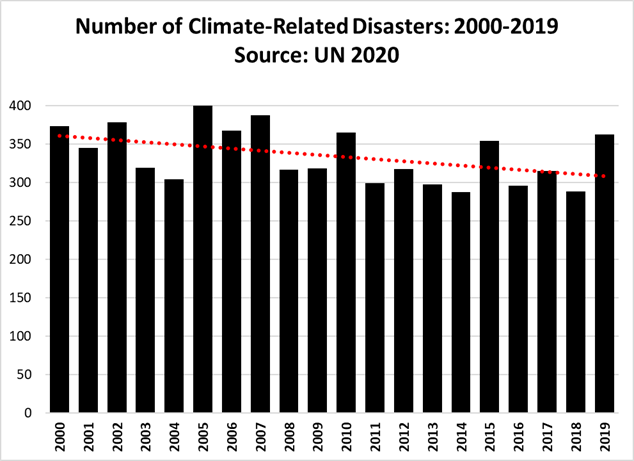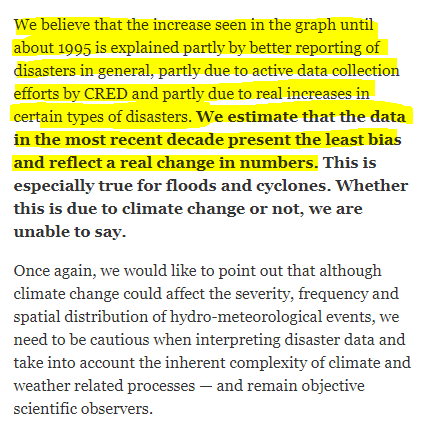
🧵
I am really glad that @hausfath @Peters_Glen made the effort to write a letter to PNAS on the SGD20
But judging from the rejoinder to their letter, RCP8.5 will be with us for a while ...
I am really glad that @hausfath @Peters_Glen made the effort to write a letter to PNAS on the SGD20
But judging from the rejoinder to their letter, RCP8.5 will be with us for a while ...
https://twitter.com/hausfath/status/1318636544677171200
I outlined the issues in a thread as well, which has details if you are interested, 100% consistent with @hausfath @Peters_Glen letter (which is behind a paywall)
https://twitter.com/RogerPielkeJr/status/1290638311732600832?s=20
The main issue is that the extreme scenarios favored in climate research (like RCP8.5, SSP5-8.5) are unambiguously flawed
SGD20 claim that these flaws are irrelevant because they are compensated by other flaws, just as big in the other direction (smdh, right?)
SGD20 claim that these flaws are irrelevant because they are compensated by other flaws, just as big in the other direction (smdh, right?)
This figure is from @matthewgburgess et al
Honestly, someone is gonna argue with a straight face that we are on track for RCP8.5 or SSP5-8.5?
Honestly, someone is gonna argue with a straight face that we are on track for RCP8.5 or SSP5-8.5?

But here is the thing
SGD20 argue that "What matters for the purpose of providing input to climate models, however, is total atmospheric CO2 content..."
SGD20 argue that errors in socio-economic drivers and land use emissions won't matter if they cancel out ...
SGD20 argue that "What matters for the purpose of providing input to climate models, however, is total atmospheric CO2 content..."
SGD20 argue that errors in socio-economic drivers and land use emissions won't matter if they cancel out ...
But guess what?
If we want to say anything about impacts of people on climate or impacts of climate on people, we need to have plausible pathways for BOTH socio-economics and land use
Errors in scenarios mess all of this up ... consider ...
If we want to say anything about impacts of people on climate or impacts of climate on people, we need to have plausible pathways for BOTH socio-economics and land use
Errors in scenarios mess all of this up ... consider ...
This brand new working paper explains why land use matters for human impacts on climate (as @RogerAPielkeSr patiently explains, its not just CO2):
SSP-Based Land Use Change Scenarios: A Critical Uncertainty in Future Regional Climate Change Projections
search.proquest.com/openview/c7d2b…
SSP-Based Land Use Change Scenarios: A Critical Uncertainty in Future Regional Climate Change Projections
search.proquest.com/openview/c7d2b…
So if your land use pathway is in error, your climate impacts projections will be ... in error
And obviously, if your socio-economic pathway is in error your impacts of climate on people & environment will be ... in error
All this seem obvious
And obviously, if your socio-economic pathway is in error your impacts of climate on people & environment will be ... in error
All this seem obvious
Ultimately, if scenarios have evolved towards implausibility, and on that point everyone seems to agree, its not really great science to say its OK because there are so many errors
We instead need to update the scenarios & choose not to live with errors as if we have no choice
We instead need to update the scenarios & choose not to live with errors as if we have no choice
If you want to go down the rabbit hole and learn how it is that the climate research community became oriented towards (what are now clearly) flawed scenarios, you are in luck @jritch and I have you covered:
papers.ssrn.com/sol3/papers.cf…
papers.ssrn.com/sol3/papers.cf…
When it comes to RCP8.5 and SSP5-8.5 in climate research -- they are fine for exploratory (ie, not real-world) research (and should be clearly labelled as such)
But today they have no legitimate place in real-world climate impacts or policy studies
/END
But today they have no legitimate place in real-world climate impacts or policy studies
/END

• • •
Missing some Tweet in this thread? You can try to
force a refresh










